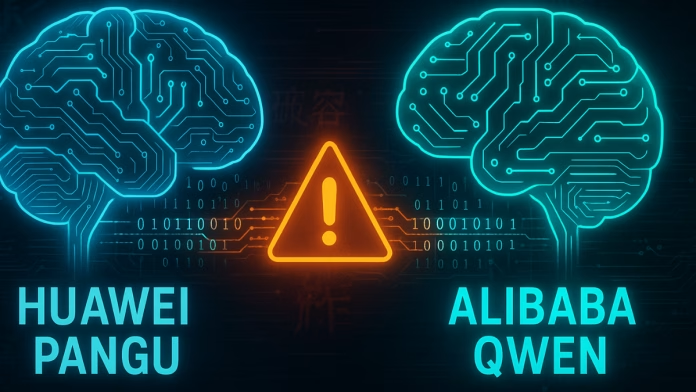🕒 Last updated on July 8, 2025
A Big Accusation Shakes the Tech World
Recently, a storm has brewed in China’s fast– growing AI Industry. Huawei, one of the country’s largest technology companies, is being indicted of copying part of another tech mammoth’s AI system.
The accusation is serious because it involves someone violating the brand implicitly and making false claims about how an important language model was created.
At the heart of the issue are two large AI models Huawei’s Pangu Pro Moe and Alibaba’s Qwen 2.5 14B. These are types of large language models, which are computer programs that can write textbook, understand questions, and indeed hold exchanges.
A little-known group called HonestAGI made the claim and posted a research paper online. This paper claimed that Huawei’s model looked very similar to Alibaba’s, suggesting that Huawei may not have trained the model from the ground up. Instead, it may have “upcycled” an existing model — a term that means reusing parts of an old model to build a new one without starting fresh.
According to HonestAGI, the similarities between Huawei’s model and Alibaba’s were too strong to be a coincidence. They said the model may not be as original as Huawei claimed, and that some of the technical details given by Huawei could be misleading.
Xiaomi Reportedly Collaborating with Huawei and BBK on Google-Free HyperOS 3
Huawei Pushes Back Firmly
Huawei’s AI research team, called Noah’s Ark Lab, quickly responded to these accusations. They issued a public statement saying the claims were not true. They stated that they created their Pangu Pro Moe model independently and did not base it on any other company’s work.
Huawei explained that their model included new and unique technical designs and that they trained it entirely using their own Ascend computer chips. These chips, made by Huawei, play a key role in their plan to become more self-reliant in AI development.
Noah’s Ark Lab also said that their developers had followed all the open-source rules. Open-source developers share their code freely for anyone to use or improve, but they still set rules about how others can use it. While Huawei admitted that they used some open-source tools, they did not say exactly which ones they used or how.
Huawei did not provide details on how it ensured the model was original, but the company maintained that they had not borrowed or built on Alibaba’s work.
Industry Race and Rising Tensions
This incident comes during a time of intense competition between Chinese technology companies to become leaders in AI. Earlier this year, a smaller Chinese AI firm called DeepSeek surprised many experts in Silicon Valley by releasing a powerful and low-cost AI model. That move pushed big players like Huawei and Alibaba to act quickly and release better products.
Alibaba released its Qwen 2.5- 14B model in May 2024, which was part of a family of models that can run on PCs and indeed smartphones. Developers designed these models for consumer use, similar to apps that chat with people, answer questions, or write essays.
BRICS blasts AI exploitation by big tech—pay up or get regulated
Huawei, on the other hand, has been more focused on erecting AI tools for governments, banks, and manufactories. Its original Pangu model came out in 2021, making it one of the first Chinese- made language models. But in recent times, Huawei has been seen as falling behind other challengers in this field.
In late June, Huawei released its Pangu Pro Moe models for free on GitCode, a Chinese platform analogous to GitHub. This was done to encourage further inventors to use and ameliorate its technology, and pos.
So far, Alibaba has not responded to the copying claims. The group that made the accusation, HonestAGI, is still a mystery. Nobody knows who is behind it, and it has not replied to media requests. Reuters, the news agency that covered this story, was also unable to contact them.


